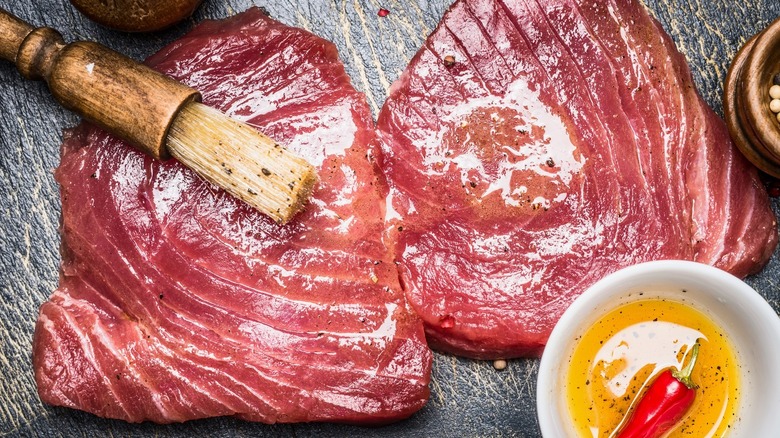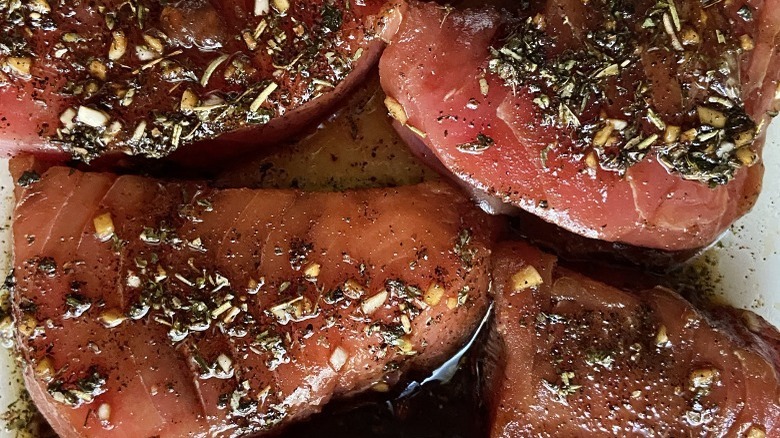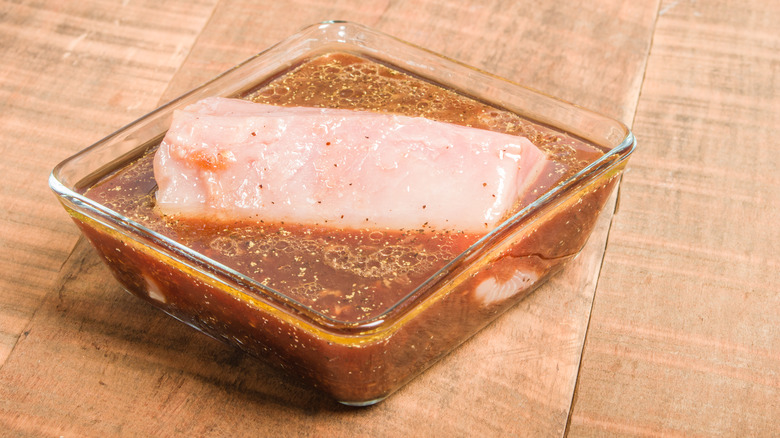The Sweet Ingredients You Need For Restaurant-Quality Tuna Steak Marinade
Fish is a delicate protein and should be handled carefully, especially if you're springing for tuna. As a result, you can't go wrong with a marinade, but they take a little thought and sometimes restraint — especially when discussing the sweeter components. Their inclusion with the rest of the ingredients is essential when adding flavor and keeping the meat tender. However, as test kitchen manager Brad Leone (via Bon Appétit) explains regarding marinades, "People tend to overdo it." After all, the goal is to complement that meat, not overpower it. This is usually where they go wrong when trying to recreate a restaurant-grade experience with a tuna steak.
Hence, there must be a balance between your marinade's salty and sweet ingredients. Moreover, try to have a focus in mind when building a flavorful bath for tuna. There are several ways to make fish taste better, but a solid immersive is an excellent place to start. So, you want to ensure that your components flatter one another and all strive to enhance the final product, which includes the types of sugar or sweetness you add.
Sugar plays an important role in marinades
With a dish like soy-grilled tuna steaks, it makes sense that the most crucial ingredient for the marinade would be the soy sauce, right? After all, the component is invoked in the name. While the salty liquid is necessary here, without the added brown sugar to tamper the brininess, there's a good chance your tuna steak would be ruined if it wasn't included. Additionally, the sweetened ingredient aids in caramelization once you throw it on the grill or in a pan.
However, whether it's honey, maple syrup, sugar, agave nectar, sugar beet syrup, or anything in between, sugary items also provide a function here. Like salt, sugar also leeches the excess moisture from the protein. This is good, because it helps the skin (if there is any) crisp and keeps the meat from becoming mush while cooking. Lastly, as previously mentioned, a sweet ingredient will counterbalance the salt, which is necessary when dealing with fish because the protein absorbs it quite well.
Other things to consider when making a marinade
Marinades are an emulsion that includes oil, herbs, spices, sweeteners, and often, acid (such as citrus or vinegar). As a result, you want to be careful with how long the tuna sits in the liquid because it acts as a tenderizer. However, too much acid or marinating time can cause the protein to denature, much like cooking does. In some instances, like when making ceviche, that's the goal. Nevertheless, if you're looking to take your nice-looking tuna steak and recreate that pan-seared ahi tuna you loved at that one restaurant, you need to be mindful.
Depending on the size of your steak and how long it's been immersed, it can only take 30 minutes to an hour to ruin a decent piece of fish. That's why the best practice is to watch how much acid goes into your marinade in the first place. If you balance the acid, salt, and sweet ingredients, your marinade can hold the protein for a much longer time (approximately up to two hours), giving it a better chance of retaining all those flavors you're trying to infuse. More importantly, it'll help ensure a meal that more closely resembles what you can find at an eatery.


